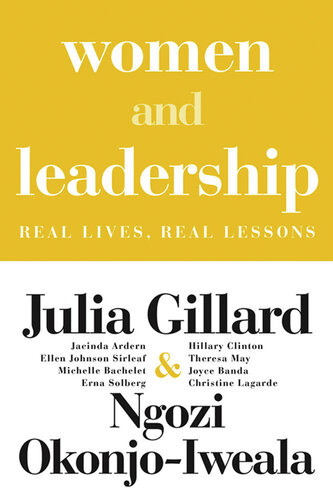
Women and Leadership
Real Lives, Real Lessons
- اطلاعات
- نقد و بررسی
- دیدگاه کاربران
نقد و بررسی

November 30, 2020
Gillard, the former prime minister of Australia, and Okonjo-Iweala (Reforming the Unreformable), the former finance minister of Nigeria, offer a unique study of female leadership based on conversations with eight women leaders from around the world. The interviewees, including Hillary Clinton, New Zealand prime minister Jacinda Ardern, and European Central Bank president Christine Lagarde, answer questions based on the authors’ hypotheses about why there are so few female leaders and how they get treated differently than their male counterparts. One key to enabling women leaders, Gillard and Okonjo-Iweala suggest (and their profile subjects confirm), is a childhood in which girls are taught they are no different than boys. Other topics include the disproportionate attention paid to women’s appearances, the requirement that female leaders be both authoritative and nurturing, how to address being perceived as “a bit of a bitch,” and the importance of networking. Noting that the Australian Parliament House has a childcare center and the U.K. House of Commons allows maternity leave, the authors reassure readers that family life and professional ambition can coexist. Full of practical advice and insights into the careers of a diverse and impressive array of women, this is a valuable handbook for putting more women in positions of power.

December 1, 2020
Eight of the world's most influential women talk about political double standards with Gillard, the former prime minister of Australia, and Okonjo-Iweala, the first female finance minister of Nigeria. The authors begin this sobering look at female leaders' progress--or lack thereof--by noting that only 57 of the 193 members of the United Nations have had a woman in their highest executive office, such as president or prime minister. Curious about gender biases, they interviewed an impressive all-star cast of power players who overcame sexism and sometimes other long odds: Michelle Bachelet was tortured by the Pinochet regime before becoming the first female president of Chile, and Joyce Banda and Ellen Johnson Sirleaf left abusive spouses en route to the presidencies of Malawi and Liberia. Drawing on academic studies as well as their interviews, the authors look beyond glass ceilings and explore hazards such as the "glass cliff," the tendency of organizations to "embrace women's leadership when they are in trouble," as Britain's Conservative Party did when it reached out after the Brexit vote to Theresa May, who looks back on the event here. Other women discuss a "glass labyrinth" of barriers, including that a woman must come across "as 'man' enough to do the job but feminine enough not to be viewed as unlikeable, or even held in contempt." Hillary Clinton and Christine Lagarde, head of the European Central Bank, recall comments about their hair while prime ministers Erna Solberg of Norway and Jacinda Ardern of New Zealand acknowledge the vital roles of a partner and relatives in helping with family responsibilities. In an especially strong argument, the authors encourage candidates not to reinforce the stereotype that high-ranking women will necessarily create a gentler world. Throughout, each contributor is refreshingly open and candid about their experiences. The case for female leadership, they rightly note, is a moral one: People should see in leaders "a reflection of the full diversity of society." Much-needed, frank talk from exceptional female leaders about how they've dealt with sexism in the line of duty.
COPYRIGHT(2020) Kirkus Reviews, ALL RIGHTS RESERVED.

December 11, 2020
A significant lack of women in leadership roles is still prevalent in the world today. Gillard, former Prime Minister of Australia, and Okonja-Iweala, Nigeria's Finance Minister from 2003-2006 and 2011-2015 and former Managing Director of the World Bank, collaborate to examine why this is happening and consider ways to work toward equality. Both women have drawn upon their own experiences and also on interviews they conducted with noted women leaders today, including Hillary Clinton, Ellen Johnson Sirleaf, Michelle Bachelet, Christine Lagarde, Joyce Banda, Erna Solberg, and Jacinda Ardern. The authors study the diverse experiences of these women and how they became leaders. Notably, they take care to consider the obstacles women in leadership face, especially the hurdles for women entering politics. The ultimate lesson learned is that there is no "right way" to be a woman leader; all situations are unique and there are no specific set of rules for balancing work and personal endeavors. Also mentioned is the impact of COVID-19 on leadership and home life for women. The book concludes with bibliographic notes and a historical timeline of women leaders. VERDICT A thought-provoking study of women and leadership and an outstanding contribution to this topic. Highly recommended.--Lucy Heckman, St. John's Univ. Lib., Queens Village, NY
Copyright 2020 Library Journal, LLC Used with permission.

January 1, 2021
For women leaders, the path to power is never smooth nor does it follow a straight line. Consider these numbers to start: Of over 900 total Nobel Laureates, 53 are female. Full gender equity isn't expected until 2115. Gillard (My Story, 2014), Australia's first female prime minister, and Okonjo-Iweala (Fighting Corruption is Dangerous, 2018), chair of the board of international vaccine alliance GAVI and former Nigerian finance minister, tee up findings from interviews with eight globally known women political leaders, including Christine LaGarde, head of the European Central Bank; Malawi President Joyce Banda; former UK prime minister Theresa May, and Hillary Clinton. The renown all have achieved leads to much introspection and learning, resulting in hypotheses about their collective lives that ring all too true. The takeaways are simple yet complex, and bathed in contradictions: Is it possible to call out sexism as a female? How to balance mother guilt with work? What's the right way to be a woman leader? (There isn't just one.) Snapshots of the pathways to power.
COPYRIGHT(2021) Booklist, ALL RIGHTS RESERVED.




دیدگاه کاربران